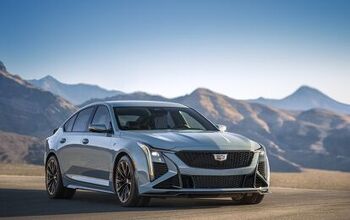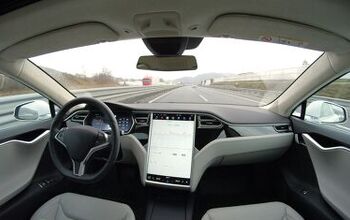Biden Administration Meets With Auto Execs, Including Elon Musk

The Biden administration held another meeting with automotive executives about how to ensure electric vehicles go mainstream. But this time it included Elon Musk, who runs the most successful EV brand in the entire world.
After taking criticism for shunning the Tesla CEO in earlier meetings, senior officials held an event on Wednesday where he and other industry leaders could contribute as to how the United States should handle a national charging infrastructure and spur adoption rates. Despite Musk having often expressed a dissenting opinion in regard to President Biden’s strategy, the White House said that the meeting was productive and resulted in a “broad consensus that charging stations and vehicles need to be interoperable and provide a seamless user experience, no matter what car you drive or where you charge your EV.”
That seems like a given and the whole industry has been talking about standardizing charging stations for years. Tesla even tried to corner the market by crafting a nationwide network of proprietary chargers before legitimate competition manifested. However, the White House did not say a similar consensus was reached over how best to handle future EV subsidies.
While Musk’s opposition to renewing the tax-credit scheme is often framed as the direct result of additional incentives tied to unionized labor. The CEO actually opposes any relaunch of the Obama-era plan to subsidize electric vehicle purchases, even those that would disproportionally advantage Tesla after having already exhausted its own quota. Musk has said that EVs will eventually need to stand on their own if they’re ever to be taken seriously, adding that perpetual government backing was irresponsible and would ultimately stifle innovation. He wants the existing quotas to run their course, ensuring a level playing field for all auto manufacturers.
Leadership from other companies has been less opposed to the ideas coming out of the Biden administration. While a few legacy automakers have pushed back (e.g. Toyota), it’s typically due to policies that would link additional subsidies to unionized labor groups that formally supported Biden as a presidential candidate. But few have suggested forgoing additional investments from the government.
Reuters noted that congress had previously approved $7.5 billion in government funding for EV charging stations in 2021 to get the ball rolling. But it added that legislation has been stalled for the new tax incentives to purchase and manufacture electric cars, suggesting that some of the proposals therein may need to be revised or outright abandoned if there’s to be any chance of it passing.
From Reuters:
Ford Motor Chief Executive Jim Farley, Chrysler-parent Stellantis CEO Carlos Tavares, Lucid CEO Peter Rawlinson and Nissan Americas chair Jeremie Papin were among other auto leaders who took part in Wednesday’s meeting, which discussed US funding to “create a national network of 500,000 chargers.”
Also attending were Transportation Secretary Pete Buttigieg, Energy Secretary Jennifer Granholm, National Climate Advisor Gina McCarthy and Infrastructure Coordinator Mitch Landrieu.
Executives from Hyundai Motor America, Subaru of America, Mazda North America, Toyota Motor North America Mercedes-Benz USA and Kia Motors America also took part.
General Motors CEO Mary Barra was also present and one wonders if she interacted with Musk after Joe Biden erroneously stated that she was the person responsible for “electrifying the entire auto industry” when Tesla holds the lion’s share of the EV market.
There was also rumored to be some talk about the Environmental Protection Agency’s recent decision to deploy tougher vehicle emissions regulations. The ruling has led to some legal challenges by several states and ethanol groups, with automakers coming to the EPA’s defense. The Alliance for Automotive Innovation, which represents nearly every major automaker, said the updated rules “will challenge the industry” but it’s ultimately more important that “critical regulatory provisions supporting electric vehicle technology are maintained.”
Meanwhile, corn growers, a Valero Energy subsidiary, and numerous ethanol producers reportedly said the new EPA rules creating stiffer emission requirements through 2026 “effectively mandate the production and sale of electric cars rather than cars powered by internal combustion engines.”
[Image: Orhan Cam/Shutterstock]

A staunch consumer advocate tracking industry trends and regulation. Before joining TTAC, Matt spent a decade working for marketing and research firms based in NYC. Clients included several of the world’s largest automakers, global tire brands, and aftermarket part suppliers. Dissatisfied with the corporate world and resentful of having to wear suits everyday, he pivoted to writing about cars. Since then, that man has become an ardent supporter of the right-to-repair movement, been interviewed on the auto industry by national radio broadcasts, driven more rental cars than anyone ever should, participated in amateur rallying events, and received the requisite minimum training as sanctioned by the SCCA. Handy with a wrench, Matt grew up surrounded by Detroit auto workers and managed to get a pizza delivery job before he was legally eligible. He later found himself driving box trucks through Manhattan, guaranteeing future sympathy for actual truckers. He continues to conduct research pertaining to the automotive sector as an independent contractor and has since moved back to his native Michigan, closer to where the cars are born. A contrarian, Matt claims to prefer understeer — stating that front and all-wheel drive vehicles cater best to his driving style.
More by Matt Posky
Latest Car Reviews
Read moreLatest Product Reviews
Read moreRecent Comments
- FinnEss At my age, sedans are difficult to get into without much neck and hip adjustment.I apologize sincerely but that is just the way it is. A truck is my ride of choice.Pronto
- Ajla The market for sedans is weaker than it once was but I think some of you are way overstating the situation and I disagree that the sales numbers show sedans are some niche thing that full line manufacturers should ignore. There are still a sizeable amount of sales. This isn't sports car volume. So far this year the Camry and Civic are selling in the top 10, with the Corolla in 11 and the Accord, Sentra, and Model 3 in the top 20. And sedan volume is off it's nadir from a few years ago with many showing decent growth over the last two years, growth that is outpacing utilities. Cancelling all sedans now seems more of an error than back when Ford did it.
- Duties The U.S . would have enough energy to satisfy our needs and export energy if JoeBama hadn’t singlehandedly shut down U.S. energy exploration and production. Furthermore, at current rates of consumption, the U.S. has over two centuries of crude oil, https://justthenews.com/politics-policy/energy/exclusive-current-rates-consumption-us-has-more-two-centuries-oil-report.Imagine we lived in a world where all cars were EV's. And then along comes a new invention: the Internal Combustion Engine.Think how well they would sell. A vehicle HALF the weight, HALF the price that would cause only a quarter of the damage to the road. A vehicle that could be refueled in 1/10th the time, with a range of 4 times the distance in all weather conditions. One that does not rely on the environmentally damaging use of non-renewable rare earth elements to power it, and uses far less steel and other materials. A vehicle that could carry and tow far heavier loads. And is less likely to explode in your garage in the middle of the night and burn down your house with you in it. And ran on an energy source that is readily extracted with hundreds of years known supply.Just think how excited people would be for such technology. It would sell like hot cakes, with no tax credits! Whaddaya think? I'd buy one.
- 3SpeedAutomatic I just road in a rental Malibu this past week. Interior was a bit plasticity, but, well built.Only issue was how “low” the seat was in relation to the ground. I had to crawl “down” into the seat. Also, windscreen was at 65 degree angle which invited multiple reflections. Just to hack off the EPA, how about a boxy design like Hyundai is doing with some of its SUVs. 🚙 Raise the seat one or two inches and raise the roof line accordingly. Would be a hit with the Uber and Lyft crowd as well as some taxi service.🚗 🚗🚗
- Dartdude Having the queen of nothing as the head of Dodge is a recipe for disaster. She hasn't done anything with Chrysler for 4 years, May as well fold up Chrysler and Dodge.


































Comments
Join the conversation
We could reduce our carbon emissions to zero and it would have close to zero effect on the climate especially while China is building hundreds of coal-fired power plants all around the world every year.
It's all good intentioned, but it's playing right into the hands of the Chinese. Mexico including the cartels couldn't be more in love with the Chinese and vise versa, along with US companies recently abandoning their Mexico factories, NAFTA/USMCA, US inflation and others. Also the world's largest mineable lithium field was just found in Mexico just south of the border. Chinese ICE vehicles not so much, emissions and reliability are a problem, but Chinese/Mexico EVs would be welcome by US consumers, plus imported chargers, parts and rebuilt/replacement batteries. Even the domestics and or "US built" will have imported EV subassemblies and batteries mostly, to be competitive and any chance of profits. I can't wait for the Ford Lightning knockoff.